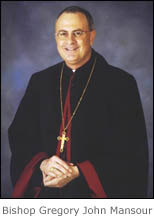 Bishop’s Perspective on Spiritual Direction
Bishop’s Perspective on Spiritual Direction
(Part III of III)
Editor’s Note: In Part I, Bishop Mansour introduced the concept of spiritual direction. In Part II, he briefly explored the purpose of spiritual direction. In today’s post on a bishop’s perspective on spiritual direction, Bishop Mansour will examine a number of different situations a spiritual director might encounter.
Below you will find a few different scenarios that a spiritual director may face. By reflecting on each scenario not only from the point of view of the spiritual director but also from the point of view of the one seeking direction, we can gain a better understanding of how we receive and give spiritual direction.
1. Someone calls to ask for spiritual direction; he/she was referred to you.
First, it’s important to ask a few questions, such as, “What exactly is this person looking for? Do they know what spiritual direction entails? Why were they referred to me? Do I have the time to give an hour a month to this person? Can I commit myself?”
A trained and qualified spiritual director who is busy with his/her own personal full time commitments should not accept more than eight directees. They should be selected by one simple criterion: “Can I be helpful to them?” The spiritual director ought to discern carefully and prayerfully before saying yes. It may be good to have a variety of directees (i.e., not all women or all men, or all priests or religious). Once a spiritual director says yes, he or she should commit to that person by prayer and availability.
2. Someone who has been with a particular spiritual director for a year expresses the desire to find someone new.
This may be the result of something on the side of the director or that of the directee. It is a cause for discernment for both. It may simply be that it is not a good fit. Nonetheless, the director must leave the directee free for this decision. Ultimately, it is the responsibility of the directee to pursue his or her own spiritual health and well-being.
3. Someone comes to talk about “spiritual dryness” in prayer.
The director should be careful not to make a hasty analysis. It is good to listen. Spiritual direction is about helping the directee respond to God’s movement in the soul. There may be obstacles to sensing this movement, and these obstacles can be discerned by direction, a retreat, some counseling, or by time set aside for leisure and prayer. The topic of discussion for spiritual direction ought to be the prayer life of the directee – how, when, why, and what helps or hinders prayer. This is the “stuff” of the conversations of spiritual direction.
4. Someone comes to talk about visions or locutions he or she has been having.
“I prefer the monotony of sacrifice to the ecstasy of spiritual experience,” said Saint Theresa, the “Little Flower.” This reminds us that the little acts of love and sacrifice are a great benefit to the soul. Locutions, visions, etc., must be discerned prayerfully. However, attention should be paid to the prayer life, personal morality, and developing virtues in the directee rather than focusing too much on those matters.
5. Someone who has been in spiritual direction for two years says that he or she is being led out of a traditional vocation during prayer.
This is cause for special attention and discernment. This discernment should be made over a year of retreats, monthly spiritual direction, and counseling (if needed). The spiritual director is important in guiding this process but does not make decisions for the directee. The process may take many different turns along the way. The spiritual director may need to confide in another person trained in spiritual direction to be sure he or she is giving the best possible guidance. Likewise, the directee must take every precaution against self-deception, which is easy to fall into and hard to detect by oneself.
6. Someone comes to a spiritual director, asking for help to discern a call to a religious, priestly, or diaconal vocation.
If a person comes seeking this kind of assistance, the spiritual director ought to give this top priority. As mentioned above, to the spiritual director guides the process, makes recommendations, and helps the directee to hear God’s voice but not make the final decision. The spiritual director may have his or her own preconceived ideas of what the directee should do, but it is very important to listen and encourage the directee to be as generous as possible with whatever God is asking.
7. A spiritual director expresses the desire to see a directee more often – even socially, if possible.
This crosses emotional boundaries and should not be done unless the directee finds another director. Only then is it prudent to develop a spiritual friendship. The spiritual director must be the one to protect the boundaries. He is always a father, never a peer. The relationship should not be one in which the director benefits from the directee in any way other than the spiritual satisfaction of knowing he is of some help to the directee. Spiritual direction should be a free gift offered and received without strings attached.
8. Someone who has worked with a spiritual director during the past year talks only about work, relationships, current problems, or dryness – and very little about prayer.
As mentioned above, prayer is the “stuff” of the conversation between director and directee. A discernment of the usefulness of spiritual direction might be in order if very little time is devoted to talking about prayer. Perhaps counseling, retreat work, better family or work relationships, new friendships, or something else can be suggested to the directee. The spiritual director should ask himself and the directee why there is so little talk about prayer.
9. Someone who has been in spiritual direction for two years complains about too much or too little direction.
Direction is more an art than a science. Too much advice is not good; neither is too little. The art of direction is very much a gift of the Holy Spirit that ought to be eagerly sought by both director and directee. Beginning each session with a prayer to the Holy Spirit is a good discipline. A spiritual director should always be improving his art. This can be done by talking to other directors or by some continuing education in the art of spiritual direction.
10. The spiritual director finds himself attracted to a certain person who comes for spiritual direction.
This is natural, but one must always remain alert. Spiritual direction is one of the most intimate of experiences. The director himself, and no one else, is always responsible for the boundaries – especially emotional boundaries. If the director feels that there is something inappropriate on the part of the directee, he should say so clearly in order to help the directee delve more deeply into the issue.
Spiritual directors must be aware of any flirting or suggestive talk and should have the courage to look at his or her own life soberly. If help is required, one’s own spiritual director should be consulted. No one should provide spiritual direction for others if that person does not also receive monthly spiritual direction. He may have to terminate the arrangement of serving as this person’s spiritual director if he cannot serve that person well or if his own weaknesses get in the way.
11. Someone asks a spiritual director for help in deciding what to do in a marital situation that has gone bad.
It is difficult to counsel one side of a marriage, but unfortunately it is hard to get both sides to agree to see someone together. Spiritual direction in itself is always helpful; this may also be the case for a spouse whose marriage is in need of help. Nonetheless, marital counseling may also be needed to compliment this. A good spiritual director knows how and when to guide a person to seek a good counselor, attend a retreat, schedule some time away for prayer, or engage in another spiritual discipline that may be helpful.
12. A spiritual director’s friend asks for help in discerning a vocational/personal crisis.
Friends are a special gift. Much spiritual direction takes place naturally in good friendships. Nonetheless, in this case, spiritual direction per se should be temporary and always with the suggestion that finding a spiritual director that is removed from the friendship side of things is a better option.
Conclusion
From this brief reflection on spiritual direction one can see that it is different from counseling, although there may be elements of this at times. It is also different from occasional advice given here and there. Spiritual direction is a consistent monthly relationship of support for the directee, and it is an art in itself. Spiritual direction is also different from occasional or frequent confession. A spiritual director who is happens to be a priest may choose to hear the confession of the directee if asked, but if the directee chooses to discuss this in spiritual direction, he or she must give explicit permission for the spiritual director to do so. The seal of confession must never be violated.
Discussions between a spiritual director and directee must always remain confidential. This should be understood by both director and directee from the very beginning. Good spiritual directors have learned the art of keeping confidences.
Spiritual direction is a special grace for both the one receiving it and the one giving it. The lived experience of those who have benefited from direction and those who serve as spiritual directors confirms this truth. The art of spiritual direction is much like prayer; it can only be learned by doing. Nonetheless, there is no substitute for reading and educating ourselves on this important matter. It is my hope that this brief introduction will serve to encourage us to do just that.
+Bishop Gregory Mansour+
+
Art for this post on a bishop’s perspective on spiritual direction: Photography of Bishop Mansour, used with permission. Feature image art: Ein ernstes Gespräch (A Serious Conversation), Ludwig Johann Passini, by 1902, PD-US author’s life plus 100 years or less, Wikimedia Commons.




